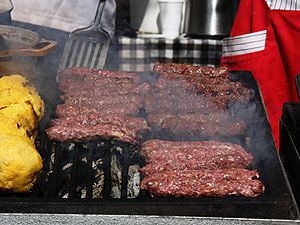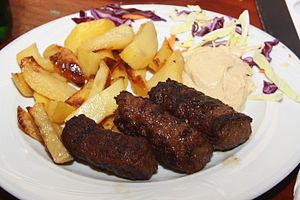- Mititei
-
For the village in Bistriţa-Năsăud County, see Nimigea.
Mititei (Romanian pronunciation: [mitiˈtej]) or mici (pronounced [mit͡ʃʲ], both Romanian words meaning "small ones") is a traditional Romanian dish of grilled minced-meat rolls made from meat of beef, lamb and pork mixed, which contain garlic, black pepper, thyme, coriander, anise, savory and sometimes a touch of paprika. Sodium bicarbonate (and sometimes broth or water) is also added to the mixture.
It is best served accompanied by mustard and beer. Ideally the mustard should not contain too much vinegar, because the sour taste does not fit with the mititei. The dish is very popular in Romania.
Contents
History
Nowadays, it is sold in restaurants close to traffic or as processed food in supermarkets.
Romanian version
The journalist Constantin Bacalbasa wrote in his book Dictatura gastronomică that mititei were invented one night at an inn called Iordache on Covaci street in the old Bucharest, held by a Transylvanian named Ionescu Iordache, famous for its sausages. One evening while he was missing sausage casings, he laid the rolls of meat directly on the barbecue.
Serbian version
Another source reports the Serbian origin of the national dish mititei, with the Serbian Cevapcici. Many dishes Serbian are similar to those of Romania, such as some sausage. However, most recipes for the former Yugoslavia reminds of the Turkish cuisine. And it is not surprising, given that both countries were under Ottoman occupation, the two national dishes, the mici and the Adana kebab is like Cevapcici.
See also
External links
- (Romanian) Wikibooks Cookbook – 1920 recipe for mititei
- (English) Mici recipe
Categories:- Skewered foods
- Meatballs
- Middle Eastern grilled meats
- Romanian dishes
- Romanian cuisine
- Cuisine stubs
- Romania stubs
Wikimedia Foundation. 2010.


